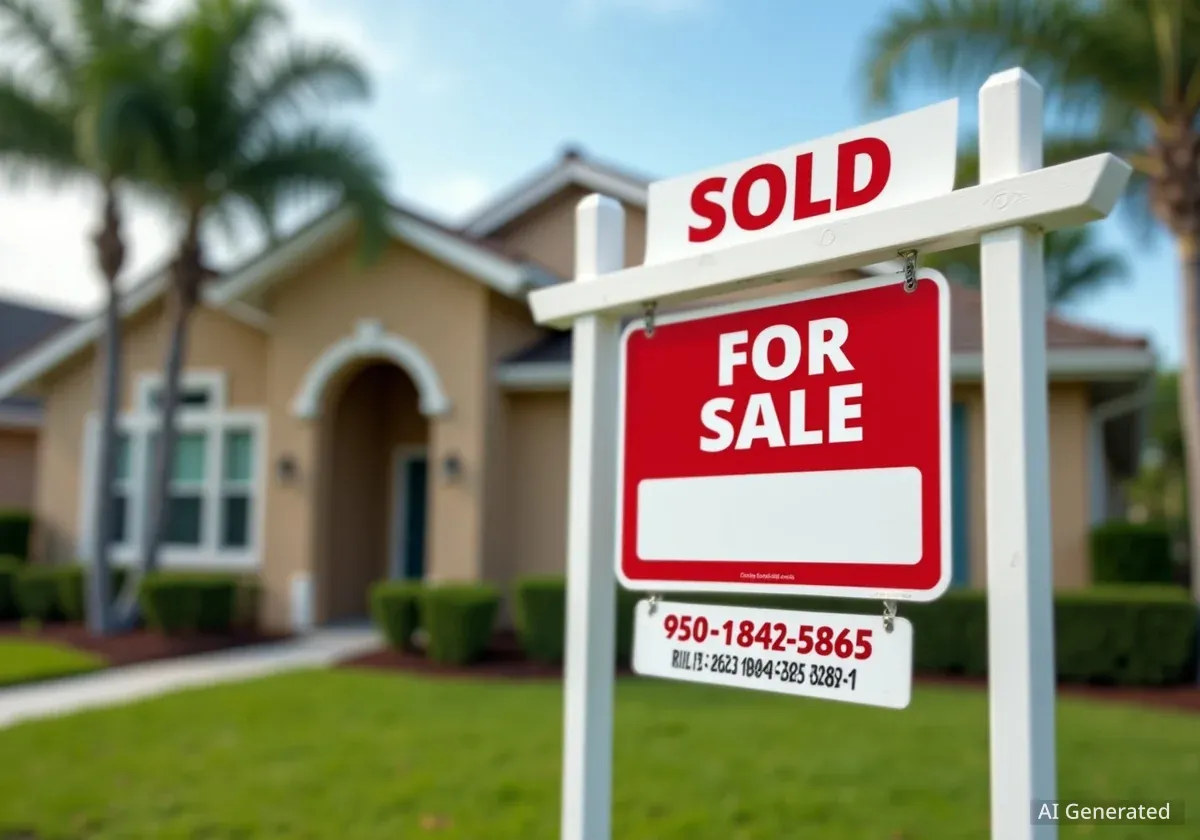Long-held beliefs about real estate, from the necessity of a 20% down payment to the idea that buying is always superior to renting, are being challenged by financial experts. As the market evolves, what was once considered sound advice may no longer apply to the economic conditions of 2025.
Financial advisors and real estate professionals are now suggesting that prospective buyers and current homeowners reconsider these traditional guidelines. A more flexible and analytical approach is needed to navigate today's high borrowing costs, market fluctuations, and changing lifestyle priorities.
Key Takeaways
- Financial experts argue that renting can be more financially sensible than buying in many major metropolitan markets in 2025.
- The long-standing requirement of a 20% down payment is no longer a strict necessity, with options for 3-5% down now widely available.
- Homeownership involves significant hidden costs, such as maintenance and repairs, which can challenge the notion of a home being a top-tier investment.
- Market dynamics are shifting, meaning assumptions about ever-rising home prices and the ease of refinancing are no longer reliable.
Rethinking Homeownership as an Investment
The idea of a home as the ultimate financial asset is deeply ingrained in American culture. However, experts caution that this belief overlooks many of the real costs and alternative opportunities available to build wealth.
Myth 1: Your Home is Your Best Investment
While property values can appreciate over time, treating a primary residence as the best possible investment can be misleading. Homeownership comes with numerous expenses that are not factored into the simple calculation of appreciation.
Scott Krase, a wealth manager at Connor & Gallagher OneSource, highlights the often-underestimated costs. "There is always some sort of maintenance on the home along with unexpected expenses like the furnace or AC going out," he notes. These costs diminish the net return on the property.
Hidden Costs of Owning
Beyond the mortgage, homeowners face costs for property taxes, insurance, routine maintenance, and major repairs like a new roof or deck. These can add up to thousands of dollars annually, impacting the overall investment performance.
Financial advisors often suggest that investing in a diversified portfolio of index funds could offer better returns and significantly more liquidity than tying up capital in a single real estate asset.
Myth 2: Home Prices Always Go Up
The belief in perpetual home price appreciation provides a sense of security, but it is not a market reality. Real estate markets are cyclical and can experience periods of stagnation or decline, depending on broader economic conditions and regional factors.
For example, recent data shows that a major market can see significant shifts. According to reports, the Florida housing market saw average home values fall by 4.8% over the past year. This demonstrates that purchasing a home does not come with a guarantee of asset growth, and values can indeed decrease.
The Rent vs. Buy Debate Revisited
For decades, the consensus has been that owning a home is financially superior to renting. However, in the current economic climate, this long-standing rule is facing scrutiny, with many experts arguing that renting can be the smarter financial move.
Myth 3: Owning is Always Better Than Renting
The mantra that renting is like "throwing money away" is being re-evaluated. High home prices and elevated mortgage rates have changed the financial equation in many parts of the country.
"In many metropolitan markets in 2025, renting can be more financially rational than buying," states Chad Cummings, a CPA and attorney at Cummings & Cummings Law.
He provides a clear example: purchasing a $600,000 home in Miami could result in a monthly mortgage payment around $5,000. A comparable property could be rented for approximately $3,200, freeing up more than $1,500 per month. That surplus can be used to invest, pay down debt, or improve one's lifestyle.
Navigating Mortgages and Financing
The process of securing and managing a mortgage is surrounded by its own set of traditional rules. Experts suggest that a more nuanced understanding is required, especially regarding down payments, interest rates, and refinancing.
Myth 4: You Need a 20% Down Payment
The 20% down payment rule is one of the most persistent myths in real estate. While a larger down payment can reduce monthly payments and eliminate the need for private mortgage insurance (PMI), it is no longer a strict prerequisite for homeownership.
"Gone are the days of needing a 20% down payment to purchase a home. It can be 3 or 5% depending on your credit rating," says Scott Krase. This flexibility allows many buyers to enter the market sooner than they otherwise could.
Myth 5: Don't Buy When Interest Rates Are High
While low interest rates make borrowing cheaper, waiting for them to drop is not always the best strategy. Market conditions are interconnected, and high rates often coincide with other factors that can benefit buyers.
Steven Afra, managing partner at Nvestor Funding, explains the potential opportunity. "Property values are currently lower and, in some areas, still declining," he says. "That creates an opportunity to buy at a better price." The strategy of "marry the house, date the rate" suggests that one can buy at a lower price now and refinance later if rates fall.
Myth 6: Refinance Whenever Rates Drop
It can be tempting to refinance a mortgage every time interest rates dip. However, this move is not without its costs. Refinancing involves closing costs that can amount to thousands of dollars, which can negate the savings from a slightly lower rate.
Krase advises a more patient approach. "With all of the closing costs associated with refinancing I would only recommend it every 8 to 10 years, depending on where interest rates are at," he suggests. A careful cost-benefit analysis is essential before proceeding.
Myth 7: It's Always Easy to Refinance
The assumption that refinancing is a readily available option can be risky, particularly for homeowners with adjustable-rate mortgages (ARMs). Many factors can prevent a successful refinance.
Refinancing Hurdles
A homeowner's ability to refinance can be blocked by several factors, including a drop in their credit score, a regional decline in property values, a change in employment status, or significant life events like a divorce.
"The pitfall emerges when families assume they will refinance before the rate adjusts," warns Chad Cummings. If unable to do so, they could face a sudden and significant payment increase, sometimes as much as 30 to 40 percent.
Lifestyle and Long-Term Planning
Finally, the decision to buy a home extends beyond pure finances and into personal lifestyle choices. The conventional wisdom that homeownership automatically improves one's life is being questioned.
Myth 8: Homeownership Always Enhances Your Lifestyle
Owning a home offers stability and control over one's living space, but it also reduces flexibility. For those whose careers or personal lives may require moving in the near future, renting is often a better fit.
"Renting provides flexibility. If you don't know where you will be in 5–7 years, then buying a house is probably not the best choice in this market," advises Jay Zigmont, PhD, CFP, and founder of Childfree Trust.
Zigmont also offers a powerful financial perspective: "Remember, your rent payment is the maximum you pay each month. Your mortgage is the minimum you pay each month." This highlights the unpredictable nature of homeownership costs, which can add financial stress rather than enhance a lifestyle.
Ultimately, the decision to buy a home requires a careful evaluation of one's personal finances, long-term goals, and local market conditions. Blindly following outdated rules could lead to poor financial outcomes in 2025's complex real estate landscape.





